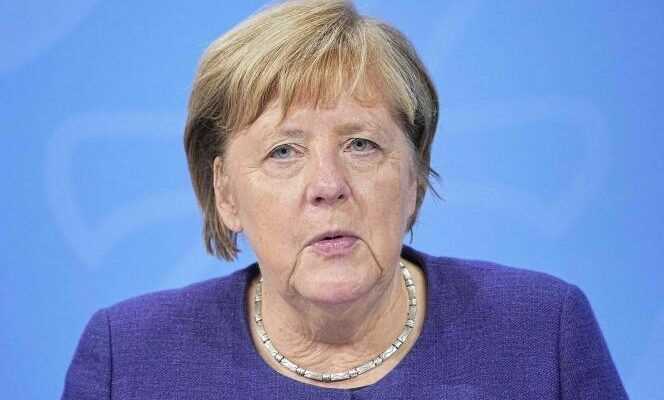Faced with an intense fourth wave of a pandemic that has already killed more than five million people worldwide since early 2020, and hospitals under pressure, German officials decided on Thursday (November 18) to impose severe restrictions on non -vaccinated and paved the way for compulsory vaccination for healthcare workers in order to stem the runaway of the Covid-19 pandemic in the country.
“We need to quickly put the brakes on the exponential increase” new infections and the occupation of intensive care beds, said outgoing Chancellor Angela Merkel, after a crisis meeting with regional heads of government, responsible for health. The meeting took place as the number of new infections jumped by 65,371 in twenty-four hours, according to data from the Robert Koch Institute for Public Health Surveillance (RKI), unheard of since the start of the pandemic.
The fourth wave of the pandemic, described as “Highly dramatic” by the departing leader, hit the first European economy in the midst of a power vacuum, with Angela Merkel’s government on the one hand responsible for handling current affairs, while the three parties SPD, Greens and Liberals are negotiating for form a new executive in early December. But the virus, “It doesn’t matter to him”, noted the one who will hand over the reins of the country after sixteen years in power, during a press conference.
Limit the social life of the unvaccinated
In detail, the leaders recommended drastically limiting the social life of the unvaccinated. Measures targeting them are already in force in the affected regions. They will be extended to the whole of the territory.
The so-called rule of “2G”, which only allows the vaccinated (“Geimpfte”) and healed them (“Genesene”) access to public places such as restaurants or concert halls will be applied as soon as the hospitalization threshold exceeds three Covid patients per 100,000 inhabitants, which is already the case in twelve of the country’s sixteen regional states. According to this provision, presenting a negative test is no longer sufficient if the person is not vaccinated. The city-state of Berlin is already applying this measure.
When the hospitalization threshold exceeds the value of six, the vaccinated and cured must, in addition to their certificate, have a negative test to access a list of establishments. Closures of shops, restaurants or bars in the regions are not excluded as a last resort. On the other hand, the schools will remain open, but the pupils subjected to regular tests.
Officials have also decided on a massive return to teleworking wherever possible and an obligation to have a health pass in transport and in the workplace.
Access to care centers or retirement homes for visitors and nursing staff will only be granted on presentation of a test lasting less than twenty-four hours, including for vaccinated or cured people. Recently, at least eleven elderly people have died, and several have been infected at a health center in Brandenburg, where only half of the caregivers were vaccinated.
Desperate lack of nursing staff
A sign of the emergency raging in the country, the leaders decided to introduce compulsory Covid-19 vaccination for staff in hospitals and nursing homes, which Angela Merkel’s government had up to ‘here refused. But the timetable for applying this measure is still unclear.
Nationally, the number of Covid patients in intensive care remains below the peak reached at the end of 2020, but hospitals are more vulnerable due to a dire lack of healthcare staff. If the situation is much more delicate this time around in German hospitals, it is because they have “4,000 intensive care beds less than a year ago due to exhausted nursing staff who quit their jobs or reduced their working hours”, explains Gernot Marx, president of the German Association for Intensive Medicine (DIVI). According to the magazine Der Spiegel, only a quarter of the 1,300 intensive care units are able to operate at full capacity, due to the lack of caregivers.
“Vaccination is and remains the way out of the pandemic”, insisted German officials, urging those undecided to show “Solidarity” and take the plunge. Vaccination is intended to become compulsory for professional footballers, they further announced.
In Germany, only 67.8% of the population is fully vaccinated, according to the latest figures from the RKI. The booster vaccinations, recommended since Thursday by the German vaccine commission (Stiko) for the entire adult population after six months, are in their infancy. The rapid implementation of these measures is still pending the validation on Friday by the Bundesrat, the upper house of parliament, of a new epidemiological law, which sets the legal framework. Developed by the SPD, the Greens and the Liberals, it has already been adopted Thursday by the members of the Bundestag at the end of a heated debate, the conservatives judging the text ” insufficient “ to effectively fight the pandemic.
